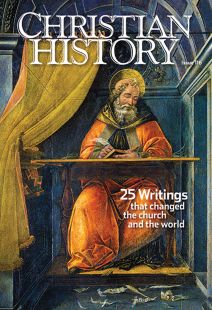Following Jesus above all
THE IMITATION OF CHRIST has been for centuries the most widely read Christian devotional book next to the Bible. Its central themes of humility and purity, as well as its focus on Holy Communion, have inspired and challenged spiritual seekers across the globe for half a millennium.
Order Christian History #116: Twenty-Five Writings that Changed the Church and the World in print.
Subscribe now to get future print issues in your mailbox (donation requested but not required).
This classic work emerged out of a spiritual renewal movement of the late medieval world known as the devotio moderna, a Latin term meaning “modern devotion.” From this community of devout followers of Jesus came a simple monk with the gift of communication named Thomas à Kempis (c. 1380–1471), who authored this small, profound book.
During the fourteenth and fifteenth centuries, the foundations of the church-centered European world began to quake and shake. Christian devotion changed to meet these new challenges. In the Netherlands in particular, a new lay movement of traditional monastic spirituality challenged the dominant vision of religion. Its followers advocated a new way of devotion for the common person based on an interior, spiritual transformation. They emphasized humility and love in the pursuit of holiness. More than anything else, they sought to combine a religion of the heart with acts of loving service to others.
The authenticity of this community and its faithful witness to practical, spiritual wisdom deeply impressed Thomas à Kempis. He joined and eventually was given the responsibility of instructing novices at the Agnietenberg Priory (Mount St. Agnes in the Netherlands), the Augustinian monastery where he spent most of his life. It is most likely there that he completed the Imitation between 1418 and 1427 as an instructional guide for his community. À Kempis could hardly have imagined how influential this devotional work would prove to be over so many years.
Deepening lives ever since
Ignatius of Loyola, founder of the Jesuits, devoted a year to the study of the Imitation in hopes of following in Jesus’ footsteps more closely. John Newton, author of the familiar hymn “Amazing Grace,” linked his conversion to the reading of this book. A horrendous storm overtook his ship on the open seas when the book was in his hands. Struck by à Kempis’s emphasis on the fragile nature of life, Newton gave his life to God.
Dietrich Bonhoeffer (see “In defiance of the gods,” pp. 41–42) was reading the Imitation the night before the Nazis led him to his execution. Dag Hammarskjöld, secretary general of the United Nations, left his copy of the book with a friend as he embarked on a plane that would crash in the dark of night. His oath of office was tucked in its pages with an affirmation of the duty to serve others. Ironically, Thomas Merton (p. 43), one of the Catholic spiritual giants of the twentieth century, began reading the book at the suggestion of a Hindu monk.
Follow the precedent of these great saints; take it up into your hands; read it; and permit the Spirit of Christ to do its transforming work. CH
This article is from Christian History magazine #116 Twenty-Five Writings that Changed the Church and the World. Read it in context here!
By Paul W. Chilcote
[Christian History originally published this article in Christian History Issue #116 in 2015]
Paul W. Chilcote is academic dean and professor of historical theology and Wesleyan studies at Ashland Theological Seminary and editor of The Imitation of Christ: Selections Annotated and Explained, a new edition of à Kempis’s work, from which this article is adapted.Next articles
Dante’s enduring influence
The Divine Comedy [#16] took readers on an unforgettable journey
Rebecca Price JanneyChristian History Timeline: Twenty Five Writing that Changed the Church and the World
Here’s where the writings described in this issue fall into the sweep of the last 2,000 years of history
the editorsThe straw that broke the camel’s back
The 95 Theses [#5] split a church and revolutionized a continent
Eric W. GritschSupport us
Christian History Institute (CHI) is a non-profit Pennsylvania corporation founded in 1982. Your donations support the continuation of this ministry
Donate




